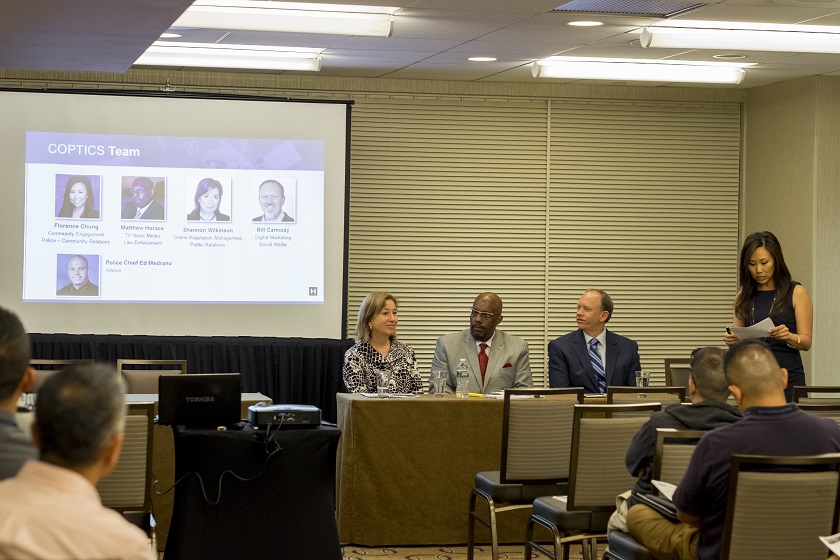
Law enforcement agencies have traditionally been behind the curve with using digital, social media and reputation management tools in their day-to-day operations. To help police departments become more effective in engaging with a digital media savvy public, three other experts and I have become active presenters in The Hetty Group’s Coptics Program. With the Coptics workshops and consulting program, Florence Chung, Bill Carmody, Matt Horace and I aim to help law enforcement professionals expand their use of the platforms that are helping shape public perception.
The Wall Street Journal has published an article about our new initiative. “Business Offers Blueprint to Improve Law Enforcement Optics,” by Ben DiPietro, is reprinted in full here.
“A group of reputation-management experts has banded together to create a program to help law enforcement agencies better manage their social media engagement and improve their perceptions with people and within communities. The so-called “Coptics” program developed by the Hetty Group draws from best practices employed by large companies that already have seen the value in being active members of social media to tell their stories and address issues that if not handled properly could blow up into big controversies, said Florence Chung, founder of the Hetty Group.
“We believe that if you aren’t telling your story, the world will,” said Ms. Chung. “And the world often doesn’t know the facts.” Shannon Wilkinson, chief executive of reputation-management firm Reputation Communications, said that although many people in law enforcement have stayed away from social media out of fear or because they prefer to stay out of the spotlight, doing so only cedes the conversation to their critics and others who aren’t representing their viewpoints. For law enforcement agencies or companies wanting to get more active in social media, Ms. Wilkinson said they need to ask themselves two questions: “How do we want to be perceived and by what audience? And how are we currently perceived and by whom?”
Bill Carmody, a digital marketing expert and chief executive of the firm Trepoint, said by teaching law enforcement how to be part of the digital conversation, and giving them tools to properly engage their audiences, will allow for departments to get involved in discussions before they go viral. Through better engagement, when incidents do occur, law enforcement will be in a better position to respond in real time because “that’s where the conversation is happening,” he said. “Your brand is being shaped by social media if you’re not shaping it yourself.”
Matt Horace, a former law enforcement official who now serves as a law enforcement analyst on CNN, said whether it’s a law enforcement agency or a big corporation, an organization needs to know how to manage a crisis and the communications surrounding it. And a key part of that is engaging on social media, knowing what’s being said and interacting in a way that is authentic and not in a way that seems disingenuous or that will erode trust. “This can’t be a stunt,” he said.”
If you work in law enforcement and would like to schedule a workshop or consulting session, please visit The Hetty Group. We also welcome support from corporations and philanthropies that would like to underwrite a workshop series in their community.
Left to right: Shannon Wilkinson, Matt Horace, Bill Carmody and Florence Chung lead an August 18, 2016 Coptics workshop at the National Asian Peace Officers Association Conference in New York City. Photo by Leven Bastian/Jolie Photography.

